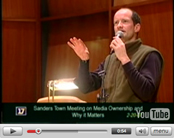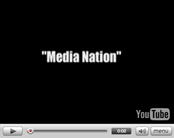Susan Douglas - NEWS YOU CAN LOSE (column)
Ever since I read the provocatively hilarious book WHERE THE GIRLS ARE, I've enjoyed Susan Douglas' commentary. Here, she comments on how banal "horse race coverage" of the presidential "election" (and I use the term loosely) remains.
News You Can Lose
By Susan J. Douglas
Read the whole article here.
Remember how Dubya got kid-glove treatment during the 2000 debates, while the press incessantly ridiculed Al Gore? Well, here we go again.
Brace yourselves. The real presidential campaign — the kind the news media have forced us to get used to — has begun, with the twin uproars over remarks by Geraldine Ferraro and the Rev. Jeremiah Wright as the inaugural moments. The way the talking heads on CNN and Fox flogged these stories made you want to outlaw 24-hour cable news. And it makes you cringe in anticipation of what’s to come.
Aren’t most of us desperate for a different kind of political coverage? Aren’t we really sick of the “horse race coverage,” the emphasis on the symbolic, superficial and idiotic?
Remember how Dubya got kid-glove treatment during the 2000 debates and campaign coverage while the press ridiculed Al Gore — who is a hundred times smarter and more principled — for allegedly claiming to have invented the Internet? Well, here we go again.
John McCain, who so far has been getting off scot-free, has committed serial gaffes of substance, in which he confuses Sunnis and Shiites and claims that al Qaeda (Sunnis) are going to Iran (predominantly Shiite) to “retool.” He should be hooted off the national stage for this. But no.
The news media, and especially the cable channels, have honed their campaign coverage routines in conjunction with the Lee Atwater-Karl Rove dirty tricks mode of politics, in which easy, negative symbols — Willie Horton, anyone? — and slurs against candidates’ strengths become instantly newsworthy, easy and cheap to cover, and thus eclipse stories about actual policy debates or events.
But just as I thought it would be a real victory for democracy if beneficent space aliens came down and eradicated CNN and Fox with laser rays, I logged onto YouTube, which has plenty of anti-Wright videos and commentary. Nonetheless, a person identifying him- or herself as Trinity, a 46-year-old “unapologetic black Christian,” posted the full video of Wright’s sermon, emphasizing what the cable channels failed to show. As of this writing, the video had nearly 475,000 views and elicited more than 10,000 comments.
Viewers expressed outrage that Fox, in particular, took Wright’s remarks out of context. Comments included “Fox News should be sued,” “Sean Hannity should be fired” (we can all dream), and “These media whores are DESPICABLE.” To his credit, CNN’s Anderson Cooper finally decided to watch the whole speech and posted a much more detailed and fair analysis — on his blog.
And that seems to be the point. Many are starting to see the Internet as the best place to get more well-rounded coverage. As this precedent-defying campaign unfolds, it does so in the midst of a huge flux in American journalism, where YouTube and other websites — AlterNet, Daily Kos, Huffington Post — challenge the mainstream media.
Economic fears about the survival of newspapers now dominate national journalists’ concerns, according to the latest “State of the News Media” report published by the Project for Excellence in Journalism. Journalists are less concerned about being mistrusted. In 1999, 30 percent of national journalists felt that loss of credibility was the profession’s biggest problem, while 44 percent felt it was overall quality of coverage. By 2007, only 9 percent cited credibility as a problem and 22 percent cited quality of coverage.
They appear to be out of sync with their audience. An August 2007 poll by the Pew Research Center reported that 53 percent of those surveyed felt the stories put out by news organizations were often inaccurate. The same percentage faulted the press for not caring about the people they report on, and 39 percent said they failed to get their facts straight. Those who get their news from the Internet are especially skeptical about cable news.
But despite this continued mistrust, the broadcast news media continues to operate in infuriatingly predictable ways. As coverage of the war in Iraq has declined in favor of the campaign, Americans’ awareness of fatalities in Iraq has “plummeted,” according to Pew Research. While the new common knowledge is that “the surge” is working, a survey of reporters in Iraq said that conditions there were “the most perilous they have ever encountered.” Unemployment in Baghdad is 30 percent and residents still live without electricity for 16 hours a day. Heard about much of this on our nation’s airwaves?
As we live through the challenges posed to conventional journalism by the ferment online, will we see broadcast news finally appreciate what their core audience wants?
Don’t count on it.
Susan J. Douglas is a professor of communications at the University of Michigan and author of The Mommy Myth: The Idealization of Motherhood and How it Has Undermined Women.



![View your cart items []](/sites/default/modules/ecommerce/cart/images/cart_empty.png)




